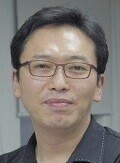hankyoreh
Links to other country sites 다른 나라 사이트 링크
[Column] S. Korea’s local elections warn of parasitic democracy


Looking at the banners for local election candidates wrapped around the intersection like a bandage, I imagined that the signs for candidates from the People Power Party and Democratic Party had party affiliations removed. When I did, I could not have told you which candidate belonged to what party. It felt akin to blind hiring, when an interviewer is not privy to background information such as the interviewee’s alma mater.
The candidates’ slogans, no more than a few words in length, were the essence of development-above-all-else thinking, and the contenders for the two major parties appeared to be in a contest over who was better equipped for the task. However, voters, ever-praised for their wisdom by both parties when the time is right, are well aware of which side is better for development.
The same day, I was making the rounds looking at houses to move into after my landlord had suddenly told me he was planning on moving into my unit himself.
Even though it was the cheapest neighborhood among Korea’s so-called “new cities,” the price of jeonse (key money) had still skyrocketed in the past year and a half. Even if I hadn’t spent a single cent of my salary in that time, I still wouldn’t have been remotely close to affording a jeonse home.
But oddly enough, except for one house the owner was living in, all other six or seven houses I toured were vacant. When I asked the realtor why this was, they answered that they were places where landlords are looking for new tenants after kicking out old tenants by saying they will be moving in the house themselves. “All to work around tenants’ right to renew their contracts,” the realtor said.
These two scenes that day aptly illustrated the results of the elections that would soon come to pass; elections that included countless pledges by candidates to pursue development throughout the country.
The vote tallies delivered outcomes that most people had anticipated. Those who were perceived to be even the slightest bit more competent when it came to development policy virtually swept elections throughout the entire country.
The purpose of development is to increase home values, so you could say that the voters were indeed wise in their choice. It is not unthinkable that many people who are hoping to further increase home values actually saw these local elections as nothing more than an opportunity to choose their real-estate asset managers.
But, of course, it is unreasonable to blame all of this solely on the Democratic Party’s competition to put forth better development policies. Development pledges have become perennial fodder in Korean elections. But the Democrats’ policy line has never been laid so bare.
Even before all the ballots were tallied, the Democratic Party said, "We will humbly accept the strident judgment of the people.” But I was taken aback by how “humbly” was used without any specific context. Are they trying to be humble about making the so-called “three lease laws” that resulted in multi-unit landlords using tricks, or are they humbling themselves for not making stronger, more appealing development pledges than, for example, relocating Gimpo International Airport?
It is not easy to be humble in a reality where predatory rent-seeking prevails above all else. All kinds of political engineering and post-mortem analyses will crop up over the election results for some time to come, but this is one reason why I see it as unlikely that analyses will come up with any profound revelations.
There is also no guarantee that the outcome would have been different even if the Democratic Party had won with more future-oriented, perhaps unrealistic pledges. And if they did indeed win, there is no guarantee that the lives of Korea’s socially vulnerable would get any better. Simply put, familiar, on-the-fly solutions have exhausted their utility.
For us to understand how we got here, we must look back on the Democrats’ past five years in power. The Democratic Party did nothing to pull the brakes on Korean society reaching this point. High on a few unanticipated election victories, the Democrats spent their time trying to build a stronghold for allied elites in both parties. These policy decisions of the Democratic Party helped nudge the public toward choosing the conservative side.
But it's not just the Democrats who lost this election.
Political parties outside the dominant two-party system, including the Justice Party, have all but shriveled up and died. The very roots of grassroots democracy have been pulled out and the foundation of life politics has also collapsed. The broken political ecosystem has become the sole stage of developmentalism. Who is to blame for all this?
By nature, representative democracy has some potential to veer toward elite-dominated oligarchy. This is due to the high barriers to entry into politics. In severe cases, the majority of voters will be reduced to acting as the host to parasitic privileged minorities.
Consider the mother flycatcher, who catches and feeds worms to baby cuckoos, unaware that the cuckoos had pushed her own fledglings out of the nest. Our representative democracy in Korea has reached the point where we should call it a “brood parasitism democracy.”
The ideology of "objective power" that philosopher Theodor Adorno spoke of has also deeply permeated Korea’s democracy. The more one fights within the bounds of objective power, the more solid the value of objective power grows. If the Democratic Party fails to introspect with new eyes, it will not be able to escape from the plight of the mother flycatcher that feeds and raises cuckoo chicks.
Paradoxically, a sliver of hope can be found in the record low voter turnout, which is inversely proportional to the enthusiasm for candidates’ development pledges.
We must closely look into the reasons behind people’s unwillingness to vote. Once we’ve done so, the demands of the underprivileged, which have been neglected over the past five years, must be reflected on in earnest.
Please direct questions or comments to [english@hani.co.kr]

Editorial・opinion
![[Guest essay] Preventing Korean Peninsula from becoming front line of new cold war [Guest essay] Preventing Korean Peninsula from becoming front line of new cold war](https://flexible.img.hani.co.kr/flexible/normal/500/300/imgdb/original/2024/0507/7217150679227807.jpg) [Guest essay] Preventing Korean Peninsula from becoming front line of new cold war
[Guest essay] Preventing Korean Peninsula from becoming front line of new cold war![[Column] The state is back — but is it in business? [Column] The state is back — but is it in business?](https://flexible.img.hani.co.kr/flexible/normal/500/300/imgdb/original/2024/0506/8217149564092725.jpg) [Column] The state is back — but is it in business?
[Column] The state is back — but is it in business?- [Column] Life on our Trisolaris
- [Editorial] Penalties for airing allegations against Korea’s first lady endanger free press
- [Editorial] Yoon must halt procurement of SM-3 interceptor missiles
- [Guest essay] Maybe Korea’s rapid population decline is an opportunity, not a crisis
- [Column] Can Yoon steer diplomacy with Russia, China back on track?
- [Column] Season 2 of special prosecutor probe may be coming to Korea soon
- [Column] Park Geun-hye déjà vu in Yoon Suk-yeol
- [Editorial] New weight of N. Korea’s nuclear threats makes dialogue all the more urgent
Most viewed articles
- 1Behind-the-times gender change regulations leave trans Koreans in the lurch
- 2Yoon’s revival of civil affairs senior secretary criticized as shield against judicial scrutiny
- 3Unexpected rate of AI development requires timely discussion of side effects
- 4Family that exposed military cover-up of loved one’s death reflect on Marine’s death
- 5Marines who survived flood that killed colleague urge president to OK special counsel probe
- 6Japan says its directives were aimed at increasing Line’s security, not pushing Naver buyout
- 7A breath of fresh air: Innovative architecture in the time of COVID-19
- 8‘Weddingflation’ breaks the bank for Korean couples-to-be
- 9South Korean ambassador attends Putin’s inauguration as US and others boycott
- 10Mother of Sewol victim travels 3,100km in 21 days to raise awareness about investigation into ferry